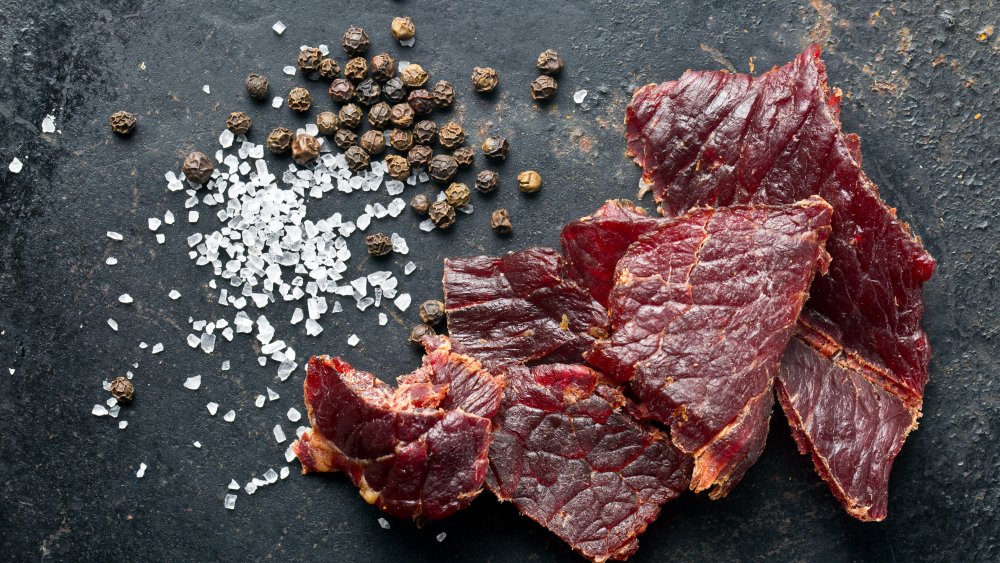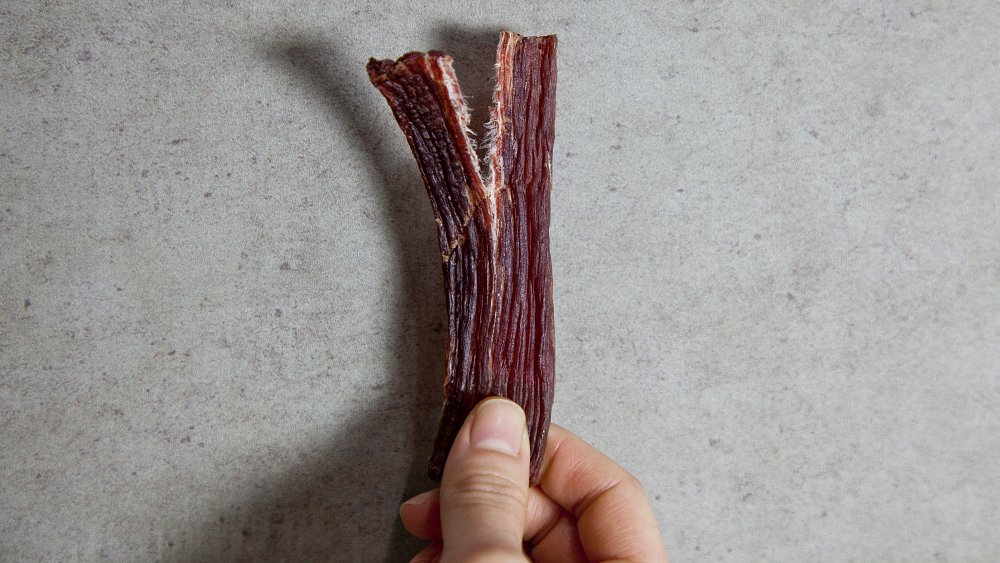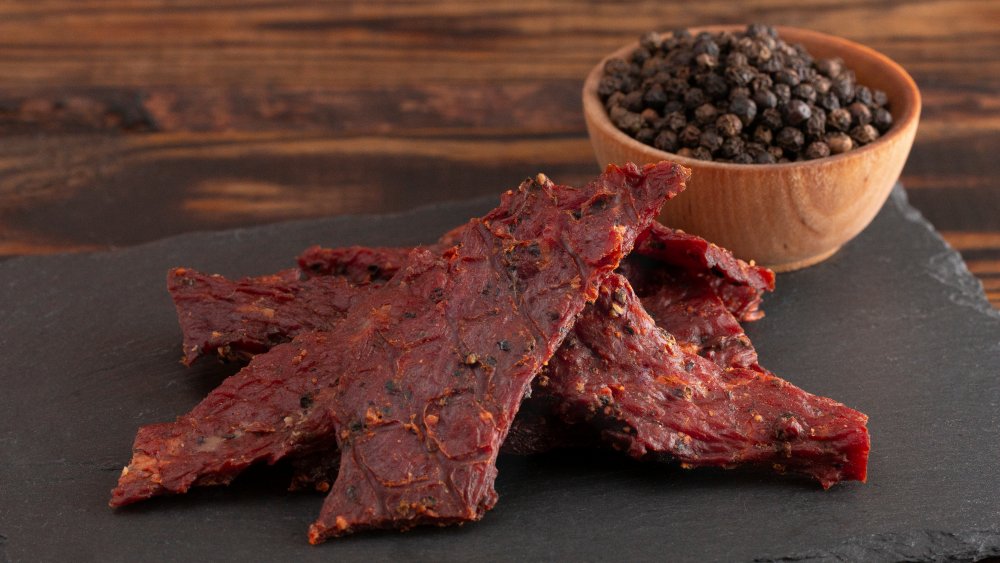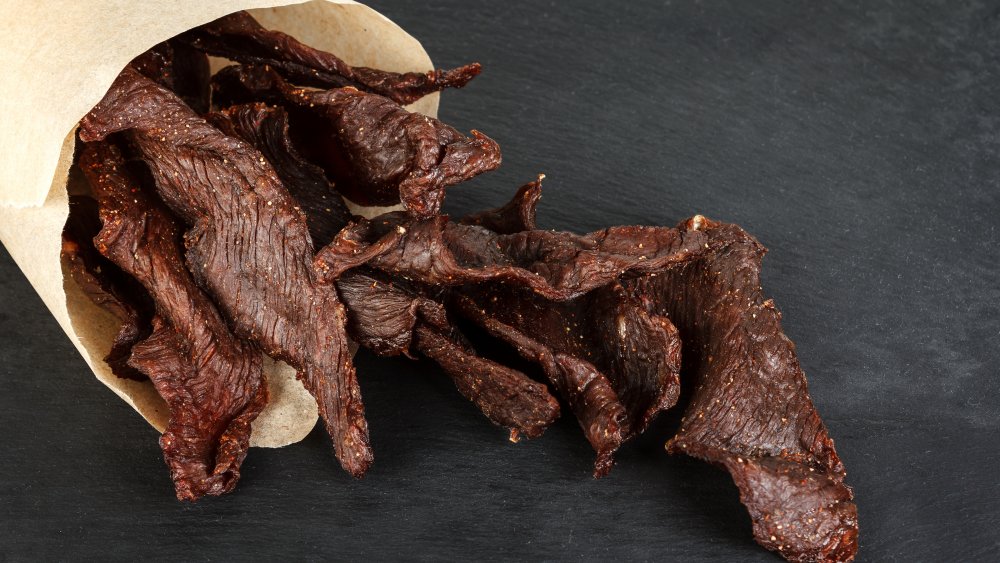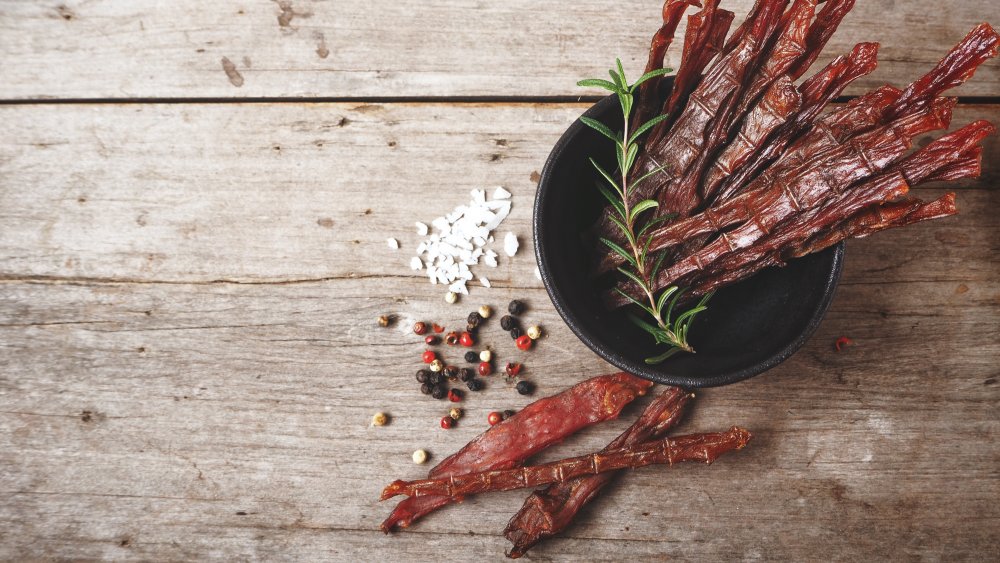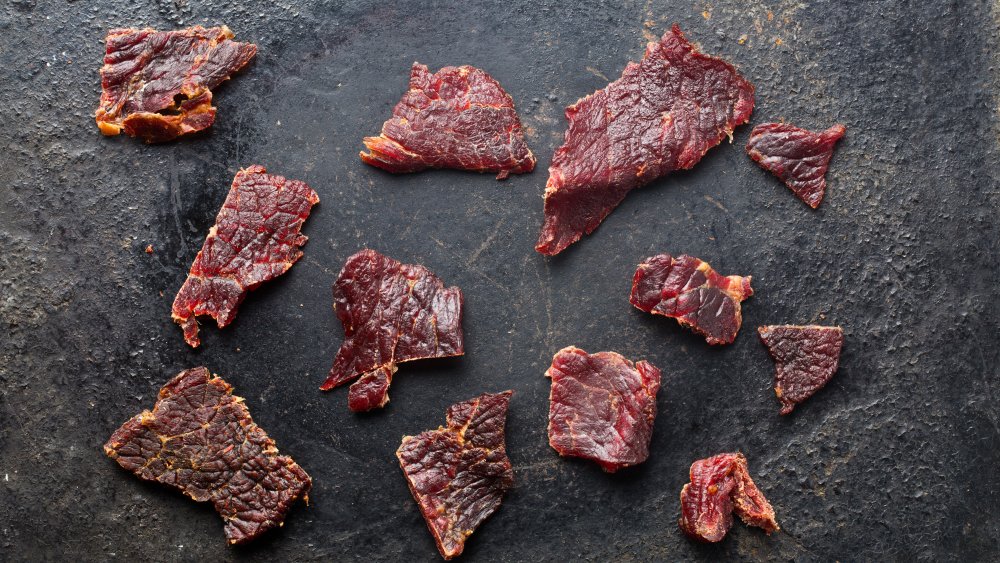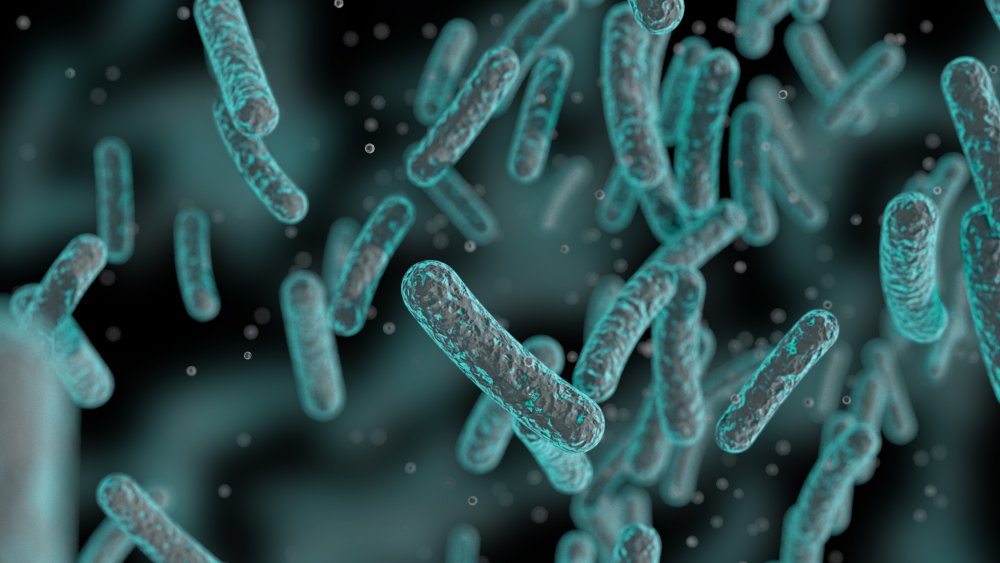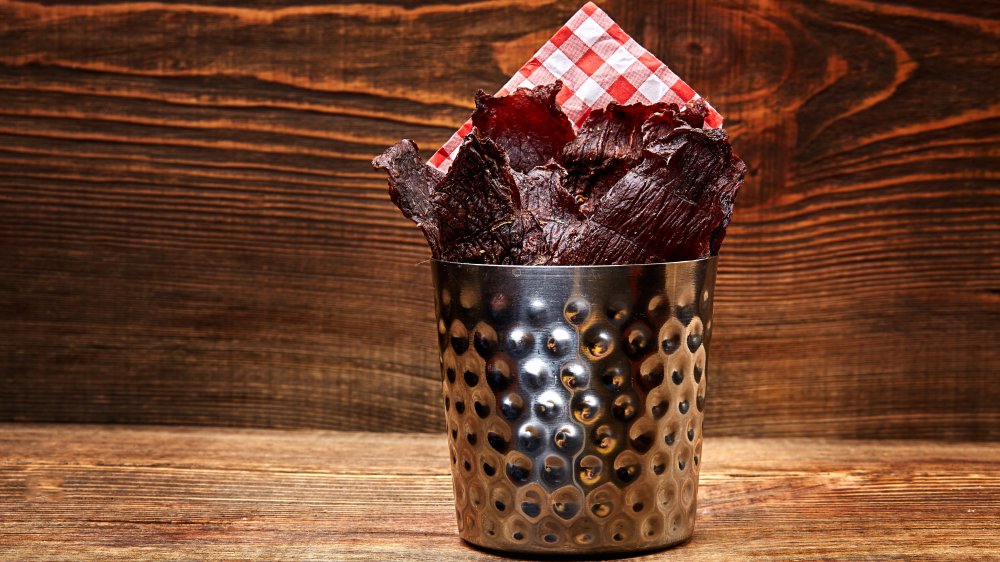The Dark Truth Behind Beef Jerky
Beef jerky stormed into the snack market right when millennials were starting to become obsessed with high-protein, low-carb diets. Munching on a slice of beef jerky allowed them to be part of one of the food tribes: paleo, keto, Whole 30, etc. In 2018, International Food Information Council Foundation's survey showed that the number of people who were following a diet had more than doubled from 14 to 36 percent in one year, and out of this, five percent were sticking to a low-carb diet.
Beef jerky, which is portable, mess-free, super rich in protein, and easily accessible — be it from a convenient store or a supermarket — became a top option. The meat jerky industry has shown consistent growth in the last five years and, as of March 2020, is worth $1.4 billion.
One 2019 study found that 70 percent of millennials worldwide prefer snacking to eating three square meals daily and, as such, go for snacks that would meet their nutritional needs. Beef jerky fits the bill for most. Though touted as a snack for guilt-free consumption, there are some established studies that suggest that it might not be the healthiest snack on the shelf. This is the dark truth behind beef jerky.
Beef jerky can affect your mental health
A 2018 study by Johns Hopkins Medicine found a strong connection between the consumption of processed foods such as beef jerky, salami, and hot dogs with mania, which is "characterized by hyperactivity, euphoria and loss of sleep," according to the study. Researchers attributed the cause of manic episodes to the nitrates that are used to cure (preserve) the meat. The study further revealed that "people hospitalized for an episode of mania had more than three times the odds of having ever eaten nitrate-cured meats than people without a history of a serious psychiatric disorder."
The curing process of meat is step one in making beef jerky. To consider the meat cured, it is important that either sodium nitrate or the more common sodium nitrite is added. Sodium nitrite is responsible for both the distinctive flavor and color of beef jerky and it also prevents bacteria.
Is it possible to find a nitrate-free substitute for your favorite beef jerky? According to The Washington Post, some types of jerkies are labeled as containing "no nitrites" or "no nitrates added," but that simply means sodium nitrite/nitrate weren't used as additives in the product. The brands could have still used celery powder or celery juice, which are naturally rich in nitrates, resulting in the consumption of the same amount of nitrogen compounds.
Beef jerky has been linked to cancer
In 2015, the cancer agency of the World Health Organization (WHO) published a report that declared processed meat carcinogenic to humans. According to the report, eating 50 grams of processed meat on a daily basis raises the risk of colorectal cancer by 18 percent. This kind of cancer is the second leading cause of cancer deaths among adults in the United States and is estimated to be responsible for 53,200 deaths in 2020 alone, according to Colorectal Cancer Alliance. One ounce of beef jerky weighs about 28 grams, so eating even a little over two servings can be cause for concern.
However, a 2020 study by Queen's University Belfast questioned WHO's blanket classification of "all" processed meat as carcinogenic. The researchers suggested that it was only the processed meat that used sodium nitrate that showed a strong link to colorectal cancer. Unfortunately, though, that does not bode well for beef jerky as without nitrates, there is no jerky.
In addition to avoiding nitrates/nitrites, the study revealed that it would be wise to consume no more than 70 grams (about 2.5 ounces) of red or processed meat per day, which is "equivalent to a piece of steak about the size of a pack of cards" or "a quarter-pounder beef burger", according to the British Nutrition Foundation.
Beef jerky is shrinking the Amazon rainforest
It's hard to fathom that a dried meat snack could be partially responsible for climate change. But, as with everything, there's a ripple effect when buying packs of beef jerky. According to Big John's Beef Jerky (via Foodbeast), it takes 2.5 pounds of beef to make just one pound of beef jerky. The Union of Concerned Scientists, a non-profit organization, revealed in a 2016 study that beef contributes the most to tropical deforestation, especially in South America, as forests are destroyed to make room for beef pastures. The Guardian reported in 2019 that "thousands of hectares of Amazon [are] being felled every year to provide meat for world markets."
With additional acreage for raising livestock there also comes the need to use more land to grow feed, like soy, for the animals, which further contributes to deforestation. Beef raised in this manner, called "deforestation-risk beef," has already made its way into the United States "in the form of processed beef, such as beef jerky," the reported explained.
According to a research by the World Resources Institute (via Climate Central), "beef is highly inefficient to produce because only 1 percent of the feed cattle consume is converted to calories that people consume from eating beef." For every unit of protein that it provides, it generates more greenhouse emissions and uses more water and land than any other "commonly consumed food."
You may not live as long if you eat beef jerky
On average, an American eats five servings, or 17 ounces, of red and processed meat per week, according to Harvard Health. "This is particularly alarming, because recent research indicates eating 3 1/2 more servings of meat per week is associated with a higher risk of death," the 2019 article explained.
The research published in The BMJ revealed that there was enough evidence to suggest that higher processed meat (like beef jerky) consumption is associated with increased risk of type 2 diabetes, heart disease, cancer, and mortality. Processed meat often contain saturated fat, carcinogens, sodium, and preservatives, which have adverse effects on your health.
A decrease in red meat consumption and simultaneous increase in healthy alternatives over time were associated with lower mortality risk, according to the study. The Dietary Guidelines for Americans 2015-2020 recommends eating seafood, legumes, nuts, and seeds for protein.
Beef jerky is loaded with sodium
Sodium is essential to maintain your body's fluid balance and maintain muscle function, but you don't need a lot of it. This is why United States Department of Agriculture (USDA) recommends consuming no more than 2,300 milligrams of sodium (one teaspoon) per day. Maintaining this limit could be a challenge when processed foods like beef jerky are part of your everyday diet. One ounce of beef jerky contains a whopping 590 milligrams of sodium — that's 25 percent of the daily recommendation.
"When there's extra sodium in your bloodstream, it pulls water into your blood vessels, increasing the total amount (volume) of blood inside your blood vessels," the American Heart Association explained. "With more blood flowing through your blood vessels, blood pressure increases." And people with high blood pressure are likely to develop heart disease or stroke. According to the association, 2,300 milligrams is the max amount of sodium you should consume daily, but the ideal limit is just 1,500 milligrams.
Beef jerky may raise your cholesterol
As is common knowledge, a high level of cholesterol is bad for your heart. It leads to the formation of plaque that sticks to the walls of your arteries and in some extreme cases, blocks them — ultimately leading to a heart attack. What increases the level of cholesterol in your blood is the saturated or "bad" fats, which is high in some meats, dairy products, deep-fried foods, and processed foods, including beef jerky.
For example, one ounce of beef jerky contains 3.1 grams of saturated fat. According to American Heart Association, the recommended daily limit of saturated fat intake is 13 grams. Citing a study by Jama Internal Medicine, The New York Times explained that by simply replacing five percent of the calories that you normally get from animal fat with polyunsaturated fats, like in fish and walnuts, you can reduce your total mortality risk by 27 percent!
Beef jerky contributes to the risk of food-borne illnesses
In the past, establishments such as Whittington's Jerky, Inc. and Central Valley Meat Co. have recalled their beef jerky, citing a possible contamination with Salmonella bacteria, which causes one million food-borne illnesses in the United States every year. Salmonella can survive on beef if it is not cooked to a minimum temperature of 160 degrees Fahrenheit, according to the United States Department of Agriculture (USDA).
What's even worse than ingesting bacteria, though, is ingesting drug-resistant bacteria. For years, ranchers had been using antibiotics to make animals grow quicker and larger. However, in 2017, the FDA stepped in and prohibited the use of antibiotics for growth promotion, The New York Times reported. Overusing antibiotics can breed drug-resistant bacteria, which can be transferred to humans through raw or undercooked meat. Despite the ban, experts revealed a "giant loophole" that allows farmers to buy antibiotics by simply stating they're used for disease prevention instead of growth promotion.
Avinash Kar, a senior attorney at the Natural Resources Defense Council, told the publication that 70 percent of the antibiotics produced for human diseases actually goes to livestock. The antibiotic-laced meat and drug-resistant bacteria is then consumed by humans resulting in harmful effects, according to the article.
Beef jerky ads may negatively influence men's diets
Vegan activist Carol J. Adams detailed on her site the many ways beef jerky is advertised as a "manly" product, citing an edible beef jerky bouquet promoted as a potential Valentine's Day gift for a man. She explained, "[The] sexual politics of meat is expressed in new commodities whose purpose is to reassert that manly men eat meat." In the past, beef jerky brands have promoted their products to appeal to men, just like several snack foods that have adopted similar marketing tactics, adding to the socially-constructed ideas around masculinity and food.
The Washington Post explained that "we're constantly bombarded with advertising and social messaging telling us that eating like a bird and dining on salad is feminine, while eating large portions and plenty of red meat is manly." And this can spell trouble, especially for men. "An individual might make unhealthy eating choices in an attempt to be more masculine — a change in behavior that could have serious health implications," WaPo revealed. This may at least partially explain why men are at a higher risk of heart disease and cancer.
